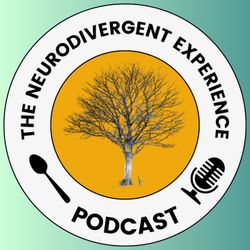Share

The Neurodivergent Experience
With Jordan James and Simon Scott.
Latest episode

25. Mindful Mondays With Ashley Dupuy: The Symphony of Sensitivity | Exploring Sound, Music & Vibration for the Neurodivergent Brain and Body
37:14||Ep. 25Sound is one of the fastest, most powerful systems in the human brain. It can soothe, destabilise, regulate, overwhelm - and, when used intentionally, it can become a profound tool for nervous system support.In this episode of Mindful Mondays, Ashley explores the neuroscience and lived experience of sound for neurodivergent minds. From music and rhythm as ancient emotional language, to binaural beats and brainwave states, humming and vagus nerve activation, ASMR, pink noise, and the surprising science behind tinnitus and musical ear syndrome.We also talk honestly about misophonia, loud noise sensitivity, and the cocktail party effect - and why regulation, not exposure, is the key.The episode closes with a guided theta journey using Alexander Voloshin of Healing Meditation Music's theta binaural beats - an immersive sound experience designed to gently support deep rest, insight, and recalibration.If sound has ever felt like too much - or not enough - this episode will help you understand why, and how to work with it.Headphones recommended.Our Sponsors:🧠 RTN Diagnostics - Right to Choose – Autism & ADHD Assessments (UK)🧘♀️ Ashley Bentley – Integrative Coaching, Breathwork & Hypnotherapy→ https://bit.ly/ashleynde🔗 Stay ConnectedInstagram: @theneurodivergentexperiencepodFacebook: The Neurodivergent Experience & Jordan's Facebook pageYouTube: @TheNeurodivergentExperienceTikTok: @neurodivergentexperience❤️ Support the ShowIf this episode resonated with you:✅ Follow or Subscribe to The Neurodivergent Experience⭐ Leave a quick review on Apple Podcasts or Spotify🔔 Turn on notifications for new weekly episodes
More episodes
View all episodes

Hot Topic: Navigating the News with a Neurodivergent Brain
27:18|In this Hot Topic episode of The Neurodivergent Experience, Simon Scott is joined by Ashley Dupuy to explore why the news feels so overwhelming — especially for neurodivergent brains.With relentless headlines, graphic footage, political division, and algorithm-driven doom-scrolling, they unpack how constant exposure to crisis can heighten anxiety, disrupt sleep, and intensify black-and-white thinking.Ashley explains the role of the brain’s reticular activating system (RAS) — the internal filtering system that shows us more of what we focus on. When we consume dark, catastrophic stories repeatedly, our brains begin scanning the world for more threats, reinforcing anxiety and hypervigilance.They discuss:Doom-scrolling and negativity biasHeightened empathy and justice sensitivityPTSD and re-traumatisation through graphic mediaADHD, stimulation-seeking, and news addictionBlack-and-white thinking in polarised timesThe pressure to “have an opinion” on everythingFeeling powerless outside your circle of controlSocial conversations built around “ain’t it awful”News detoxes and intentional media boundariesUsing gratitude and inspiration to rebalance the brainA thoughtful, honest discussion about emotional intensity, media overwhelm, and how to stay informed without sacrificing your nervous system.Our Sponsors:🧠 RTN Diagnostics - Right to Choose – Autism & ADHD Assessments (UK)🧘♀️ Ashley Dupuy – Integrative Coaching, Breathwork & Hypnotherapy→ https://bit.ly/ashleynde🔗 Stay ConnectedInstagram: @theneurodivergentexperiencepodFacebook: The Neurodivergent Experience & Jordan's Facebook pageYouTube: @TheNeurodivergentExperienceTikTok: @neurodivergentexperience❤️ Support the ShowIf this episode resonated with you:✅ Follow or Subscribe to The Neurodivergent Experience⭐ Leave a quick review on Apple Podcasts or Spotify🔔 Turn on notifications for new weekly episodes
101. Who Am I Without the Mask? Unmasking as a Neurodivergent Adult
01:03:10||Ep. 101In this episode of The Neurodivergent Experience, Simon Scott is joined by Ashley Dupuy to explore the emotional reality of unmasking as a neurodivergent adult — especially after late diagnosis.With Jordan still in New Zealand, Simon and Ashley dive into identity shifts, grief, anger, boundaries, and the destabilising question so many people face:Who am I without the mask?They discuss how masking begins as a survival strategy rooted in nervous system safety, but can eventually leave you disconnected from your authentic self. From overcorrecting into bluntness to navigating workplaces and losing friendships built on compliance, they unpack what really happens when you stop performing.This episode explores:The identity crisis after late diagnosisGrief, anger, and the “what could I have been?” questionFawning, people-pleasing, and compliance-based friendshipsOver-correcting during early unmaskingAddiction, substances, and masking sociallyBeing told “you’ve changed”Boundaries and losing fair-weather friendsProfessional masking and workplace minefieldsThe difference between authenticity and dysregulationNervous system regulation as the foundation of unmaskingCuriosity vs shame when you “get it wrong”A thoughtful, validating conversation about learning to be yourself — slowly, imperfectly, and without burning your life down in the process.Our Sponsors:🧠 RTN Diagnostics - Right to Choose – Autism & ADHD Assessments (UK)🧘♀️ Ashley Dupuy – Integrative Coaching, Breathwork & Hypnotherapy→ https://bit.ly/ashleynde🔗 Stay ConnectedInstagram: @theneurodivergentexperiencepodFacebook: The Neurodivergent Experience & Jordan's Facebook pageYouTube: @TheNeurodivergentExperienceTikTok: @neurodivergentexperience❤️ Support the ShowIf this episode resonated with you:✅ Follow or Subscribe to The Neurodivergent Experience⭐ Leave a quick review on Apple Podcasts or Spotify🔔 Turn on notifications for new weekly episodes
24. Mindful Mondays With Ashley Dupuy: How Gratitude Rewires the Neurodivergent Brain
33:40||Ep. 24If the word gratitude has ever made you roll your eyes, this episode is for you.This isn’t about toxic positivity or pretending everything is fine. It’s about neuroscience.In this episode, Ashley explores how gratitude reshapes your Reticular Activating System (RAS) — the brain’s internal filter that decides what gets noticed. For neurodivergent nervous systems wired for intensity, pattern recognition, and threat detection, that filter can easily become tuned toward what’s overwhelming or missing.Gratitude, practised intentionally, becomes a neural training practice.You’ll learn how negativity bias and modern media hijack your attention, why simply searching for something to appreciate changes your brain, and how a simple six-week challenge can gently retrain your inner lens.This is grounded, science-backed, and fully relevant to the lived experience of neurodivergence.Gratitude isn’t naive.It’s neural.Our Sponsors:🧠 RTN Diagnostics - Right to Choose – Autism & ADHD Assessments (UK)🧘♀️ Ashley Bentley – Integrative Coaching, Breathwork & Hypnotherapy→ https://bit.ly/ashleynde🔗 Stay ConnectedInstagram: @theneurodivergentexperiencepodFacebook: The Neurodivergent Experience & Jordan's Facebook pageYouTube: @TheNeurodivergentExperienceTikTok: @neurodivergentexperience❤️ Support the ShowIf this episode resonated with you:✅ Follow or Subscribe to The Neurodivergent Experience⭐ Leave a quick review on Apple Podcasts or Spotify🔔 Turn on notifications for new weekly episodes
Hot Topic: I Swear (2025) – The Most Neuroaffirming Film We’ve Seen
24:46|In this episode of The Neurodivergent Experience, Jordan James and Simon Scott explore the powerful impact of the British biographical drama I Swear — a neuroaffirming film based on the life of John Davidson, who developed Tourette’s syndrome as a child and later became a speaker and advocate.They reflect on their wider experiences of being neurodivergent — the bullying, blame, masking, rejection, and misunderstanding that shaped their early lives. The film mirrors what it feels like to grow up different in a world that often responds with judgment rather than understanding.Jordan shares memories of being mocked at school and blamed for behaviours he couldn’t control, while Simon opens up about the emotional impact of recognising how much he has masked over the years.The conversation also explores how society can “disable” people through discrimination and rigid expectations, and how those social responses create lasting wounds. They reflect on the film’s empowering message of turning lived experience into advocacy — and how authentic neurodivergent representation can help transform pain into purpose and community.They discuss:Tourette’s syndrome and visible ticsChildhood bullying and social rejectionBeing blamed for behaviours you can’t controlMasking and suppressing neurodivergent traitsAnxiety and symptom exacerbationLaw enforcement misunderstandingsDisability vs social disablementGrowing up feeling “othered”Authentic neurodivergent representation in filmTurning lived experience into advocacy and communityAn emotional, reflective episode about neurodivergence, identity, stigma, and the power of storytelling to shift perspective and create change.Our Sponsors:🧠 RTN Diagnostics - Right to Choose – Autism & ADHD Assessments (UK)🧘♀️ Ashley Bentley – Integrative Coaching, Breathwork & Hypnotherapy→ https://bit.ly/ashleynde🔗 Stay ConnectedInstagram: @theneurodivergentexperiencepodFacebook: The Neurodivergent Experience & Jordan's Facebook pageYouTube: @TheNeurodivergentExperienceTikTok: @neurodivergentexperience❤️ Support the ShowIf this episode resonated with you:✅ Follow or Subscribe to The Neurodivergent Experience⭐ Leave a quick review on Apple Podcasts or Spotify🔔 Turn on notifications for new weekly episodes
100. How Neurodivergent People Self-Sabotage
01:07:36||Ep. 100In this milestone 100th episode of The Neurodivergent Experience, Jordan James and Simon Scott reflect on self-sabotaging behaviours — from procrastination and perfectionism to impulsivity, addiction, rigid thinking, and negative self-talk.They share personal stories about turning down opportunities, abandoning creative projects, gaming addiction, risk-taking, substance use, phone dependence, and the ways neurodivergent intensity can both fuel success and quietly derail it. The conversation explores how fear of failure, rejection sensitivity, and the need for stimulation often sit beneath these behaviours.From code-switching and conscious camouflaging to asking “do you want my opinion?” before giving it, they reflect on how intentional change, emotional regulation, and meeting people where they are can reduce conflict without losing identity.They discuss:Procrastination, perfectionism, and fear of failureNegative self-talk and rejection sensitivityRisk-taking, addiction, and impulsivityGaming, gambling, substances, and phone dependenceRigid thinking and relationship conflictOversharing and social misstepsAuthenticity vs accountabilityCode-switching and conscious camouflagingMeeting people where they are Learning to pause before speakingA reflective, honest episode about growth, responsibility, and the messy reality of being neurodivergent — 100 episodes in.Our Sponsors:🧠 RTN Diagnostics - Right to Choose – Autism & ADHD Assessments (UK)🧘♀️ Ashley Bentley – Integrative Coaching, Breathwork & Hypnotherapy→ https://bit.ly/ashleynde🔗 Stay ConnectedInstagram: @theneurodivergentexperiencepodFacebook: The Neurodivergent Experience & Jordan's Facebook pageYouTube: @TheNeurodivergentExperienceTikTok: @neurodivergentexperience❤️ Support the ShowIf this episode resonated with you:✅ Follow or Subscribe to The Neurodivergent Experience⭐ Leave a quick review on Apple Podcasts or Spotify🔔 Turn on notifications for new weekly episodes
23. Mindful Mondays With Ashley Dupuy: Thoughts Are Not Facts | Growth Mindset for Neurodivergent Minds
38:48||Ep. 23Seeing your life clearly doesn’t mean seeing it harshly.In this episode of Mindful Mondays, we explore how mindset and reframing shape not just how we think - but how our nervous system experiences the world.Many neurodivergent and highly sensitive people live with a loud inner commentary. Thoughts can feel convincing, critical, and fixed - yet thoughts are not facts.Together, we explore:* Growth mindset through a neurodivergent lens* Why reframing supports nervous system safety (not toxic positivity)* How meaning - not circumstances - shapes our experience* Why challenges often deepen, rather than diminish, a meaningful lifeDrawing on wisdom from thinkers and creatives including William James, Hugh Mackay, Tina Turner, Joan Rivers, Kurt Vonnegut, and Michael Jordan, this episode invites a gentler, truer way of seeing yourself.You’ll also be guided through a reflective visualisation - The Gallery of Your Life - offering a new relationship with past moments, old judgments, and the stories you live inside.This is not about fixing yourself.It’s about learning to see yourself in a way that supports you.Our Sponsors:🧠 RTN Diagnostics - Right to Choose – Autism & ADHD Assessments (UK)🧘♀️ Ashley Bentley – Integrative Coaching, Breathwork & Hypnotherapy→ https://bit.ly/ashleynde🔗 Stay ConnectedInstagram: @theneurodivergentexperiencepodFacebook: The Neurodivergent Experience & Jordan's Facebook pageYouTube: @TheNeurodivergentExperienceTikTok: @neurodivergentexperience❤️ Support the ShowIf this episode resonated with you:✅ Follow or Subscribe to The Neurodivergent Experience⭐ Leave a quick review on Apple Podcasts or Spotify🔔 Turn on notifications for new weekly episodes